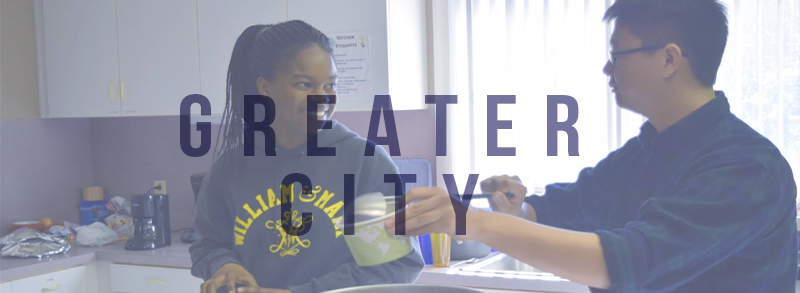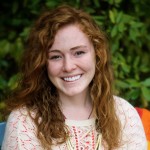It Started with One Question
In January 2015, Brian Jenkins, now a senior at the College of William and Mary in Williamsburg, Virginia, returned from a short term mission trip to Atlanta, GA with a question. After meeting people who lived under interstate bridges and on the streets of Atlanta, he wondered:
What does poverty in Williamsburg look like?
That January, Brian and his friend, Scott Gemmell-Davis, local Williamsburg resident and current junior at the College of William & Mary, drove around the city to 14 different motels in the area. They inquired of the motel managers if they had any long-term residents who could benefit from food assistance. Every single manager replied, “Yes.”
Learning about Poverty in Williamsburg
In a recent interview with Brian, he recounted the process of learning about poverty in Williamsburg.
“We sent emails and talked to our friends. We met with as many community leaders as we possibly could in order to learn more about the issue. We met with the Executive Director of United Way. We met with the Executive Director of Greater Williamsburg Outreach Mission and House of Mercy. We met with existing organizations and governmental organizations as well as leaders of churches so that we could get to know the issue first and foremost.” Brian explained.
“At the same time, Scott and I met with our close, Christian friends about the issue of poverty and suddenly a group of people began meeting together every week, and I didn’t know half of them. People had been spreading the word and found out we were brainstorming something. We met and talked about poverty in Williamsburg but also what we could do about it. Action is very important to me.”
Discouraged From Action
Brian told me that, initially, they were discouraged from what they were doing.
“We were told that liability was a huge issue…that we had to be careful…that these people would steal from us…that they were somehow a little bit dangerous…‘You can’t trust them.’ That was mostly from the governmental side of things. Some of the non-profit leaders dismissed us because we were college students and ‘wouldn’t be able to sustain a real effort’…partially because we leave after four years, but even more so because we leave every summer and winter,” he said.
Yet, this group of students who represented many different campus ministries and denominations were determined to act. They managed to secure small grants and other donations from local churches and on-campus ministries that funded bagged lunches. Brian, Scott, and a few other students then developed a protocol whose foundations were ultimately in the Gospel of Jesus Christ. The idea was to meet up every Saturday, pray together, place the food into bags, be paired with a partner, and discuss the purpose of their upcoming motel visit.
Motel Visits
Prior to the students’ arrival, the motel manager gave Brian and Scott a list of residents who would be willing to receive visitors on Saturdays for food assistance. Once at the motel, two students (typically one male and one female student) approached a resident’s door. Each pair of students was given a list of 3-5 doors to knock on. Those first few knocks quickly turned into friendships which grew and developed as the students returned week after week to the same individuals.
The protocol remained: Approach. Pray. Set the food aside. Knock. Smile. Engage in a conversation. Before leaving, offer the food. Offer a hug. Leave and pray. Return next week.
Food Preparation
Brian admitted that in the beginning, working from a very small budget, the students prepared cold bag lunches. The lunches consisted of low-fat turkey and cheese sandwiches on wheat bread, a snack food, and bottled water. “We were trying to minimize costs as much as possible, but we did make small decisions to make the meal as nutritious as we could,” he explained.
Last summer 2015, what had started as an idea became, certifiably, a non-profit organization called Greater City. Greater City was fully sustained by consistent and committed student volunteers and had enough of a budget to purchase better quality food as well as other necessities.
In a recent interview, Allison Bowers, current sophomore at the College of William & Mary and Director of Food Preparation, explained that in December 2015, members of Greater City elected to restructure the food preparation system.
Allison explained, “We want something nutritious, warm, delicious, inexpensive, and it all has to fit within one container. So, we’ll typically do soup and tortilla chips with a water bottle. We’ve done baked ziti a lot with green beans and a salad. They tend to not like it when I do a salad as the main course…but we’ll do that every now and then. We want food that’s good for you and filling. It needs to be a meal that’s substantial enough…I always make sure there is some sort of vegetable, protein, and carb.”
The cold bagged lunches have come a long way as has the motley crew of students who gathered Saturday mornings.
Allison shared with me that, “a lot of people who help with ‘food prep’ hear about Greater City and don’t have an affiliation with a campus ministry. They may not even be religious, and they still come help…Christianity has this reputation of being this very oppressive, very hateful voice a lot of times. I think it’s very important to show that, yeah, there are those bad things, but also some really amazing things can come out of faith.”
The Very First Visit
One year ago this April, Brian, Scott, and a few friends visited an inn in Williamsburg. Brian recollects, “When we went in April for the first time – that was just supposed to be “it.” It was a trial run to see how it went, and then we would come back in the fall and really get things started. But after that first visit, we decided, we have to come back.”
“Why?” I asked.
“Because of the people,” he said, “the people received us so well. We just felt compelled to go back. So, we ended up going every single Saturday the rest of the semester…and every week during the summer.”
Members of Greater City knew commitment and consistency would be essential. Relationships were the goal.
In the words of sophomore and previous Collegiate Engagement Associate for Greater City and current Site Leader at the inn, Chikamso Chukwu: “It is a lot easier to serve materially because relationships involve a lot of work. On-going work. They are something you continue investing in. And you might not see the returns immediately. You might have to wait a few months, and that’s hard. Definitely.”
She says, “We want to do God’s will in this city, not just have an organization… I mean, it’s great to help people and material needs are important. But looking at a person as a whole person is very important because that’s how God sees them. That plays heavily into how we approach people.”
Core Values
What are Greater City’s core values?
Read and hear the beautifully eloquent words of Chikamso Chukwu:
“We definitely believe that God dignifies every single human being because he created us and he loves us… and he wants to bring us into his family. We really have tried to exemplify the love of Christ in our consistency and showing up. And just realizing our privilege as college students in engaging with people who are going through a difficult time…and withholding judgment in every case. Because it’s very easy to say these people have done this to land themselves in this situation. But God doesn’t see them as their mistakes. They’re human beings, not just empty stomachs to feed. They are creations of God and they deserve to be treated that way.”
Over 300 Warm Meals Served Since January 2016
Though Greater City’s purpose is relational, it is useful for me to point out that they have also had quantifiable results as well as many, many more stories and memories to share from their new friendships. Since January 2016, Greater City has served over 300 warm meals in two motels, formed new partnerships with local businesses such as Aroma’s Coffeehouse and the Williamsburg Farmer’s Market, and hosted an on-campus workshop (information from Greater City’s March 2016 Newsletter).
Greater City’s mission statement is simple: “Greater City is a movement fueled by the Williamsburg community and run by students at William & Mary, serving those living through poverty and homelessness in local motels through food assistance and relational support” (www.greatercity.co). God has used Greater City to impact the breadth of the city of Williamsburg: college students, local churches as they partner with Greater City, local businesses, residents at the inns, and many more.
Gospel-Centered Approach to Poverty
I asked Brian why he thought Greater City has been successful. This is his response, “I personally think it’s successful because God is in it. And he is calling his community as a whole, his Body as a whole to face this issue of poverty…The foundation of Greater City is the Gospel of Jesus Christ. When I say the Gospel, I mean the true historical narrative of the life, death, and resurrection of Jesus Christ for the forgiveness of sins in the individual. But I also mean the redemption of communities and the flipping of the social framework. Of making the least, that is the poor, the sick, the hungry, into the greatest. Those are the core values of Greater City. We feel compelled by the love of God to love all people, including the poor.”
Jena is a senior at the College of William & Mary in Williamsburg, Virginia majoring in Socio-Cultural Anthropology and minoring in Linguistics. She is actively involved in Cru as well as other formal and informal worship and prayer gatherings throughout campus.



Mark McAnlis
9 years agoLove your story, passion and action. Lord bless you!
Jena K. Gray
9 years agoThank you so much! If you think to, please pray for guidance and continued grace for Greater City in the future.